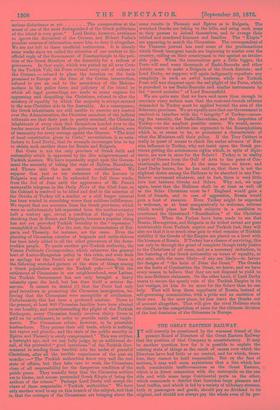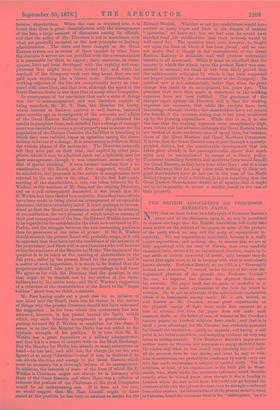THE GREAT EASTERN RAILWAY.
I T will scarcely be questioned by the warmest friend of the ference; shareholders. When the case is inquired into, it is found that there is great dissatisfaction with the management of the line, a large amount of discontent among its officials, and that the policy of the Directors is not in accordance with what are generally accepted as the best principles of Railway administration. The rates and fares charged on the Great Eastern system are in excess of those exacted by other lines, the districts it serves are not provided with the accommodation it is reasonable for them to expect ; their resources, in conse- quence, have not been developed with the rapidity and com- pleteness that might have been looked for ; and while the employes of the Company work very long hours, they are not paid upon anything like a liberal scale. Nevertheless, the working expenses of the line are exceptionally heavy as com- pared with other lines, and that is so, although the speed of the Great-Eastern trains is less than that of many other Companies.
In consequence of his conviction that such a state of things was due to miimanagement, and was therefore capable of being remedied, Mr. M. T. Bass, the Member for Derby, whose interest in Railway matters is well known, initiated some months ago an investigation of the accounts and affairs of the Great Eastern Railway Company. He published the results in pamphlet form, and, satisfied that a change of manage- ment was essential to rescue a great property and to secure for the population of the Eastern Counties the facilities in travelling to which they were entitled, began an agitation among the share- holders in favour of a change. It is unnecessary to follow in detail the various phases of the movement. The Directors naturally felt they were put on their trial, and replied by other pam- phlets, which it may be admitted made out a tolerable case for their management, though it was sometimes secured only by dint of special pleading. It soon became manifest that a re- constitution of the Board, as at first suggested, would not be acceded to, and proposals in the nature of compromises were rejected by the one side or the other. At the last half-yearly meeting of the shareholders, a vote was taken between Sir E. Watkin, as the nominee of Mr. Bass, and the retiring Directors, and on a poll subsequently demanded it was found that Sir E. Watkin had been elected by a majority. Since that time, efforts have been made to bring about an arrangement of an amicable character, but have invariably failed. It is not, perhaps, to be won- dered at that the Board in possession should object to schemes of reconstitution, the very proposal of which involves censure of their past management of the line. Sir Edward Watkin has come to be regarded as the candidate for the chair now occupied by Mr. Parkes, and the struggle between the two contending parties is thus for possession of the reins of power. If Sir E. Watkin should succeed, the present Board will probably resign, as it will be apparent that they have lost the confidence of the majority of the proprietary; and there will be new Directors,who will be more or less the nominees of the Member for Hythe. The decision of the question is to be taken at the meeting of shareholders on the 5th prox., called by the present Board for the purpose; and in a matter of such importance, it is much to be desired that the proprietors should take part in the proceedings in full force. We agree so far with the Directors that the question is one that ought to be decided, not by any section of the share- holders, but by the entire body; and Sir E. Watkin's suggestion of a reference of the reconstitution of the Board to the" larger holders" alone was, we think, a mistake.
Mr. Bass having made out a good ease for an infusion of new blood into the Board, there was no reason in the nature of things why the present Directors should not have welcomed the suggestion. In the form which the controversy has now assumed, however, it has passed beyond the limits within which any such friendly arrangement is practicable. By putting forward Sir E. Watkin as candidate for the chair, it seems to us that the Member for Derby has not added to the intrinsic strength of his position. It is true that Sir E. Watkin has a great reputation as a railway administrator, and that his is a name to conjure with on the Stock Exchange. But the Member for Hythe has already so many enterprises on hand—he has had, and still has, the charge (to use his own figure) of so many "derelicts"—that it may be doubted if he can devote the time and energy to the Great Eastern which must be necessary for a thorough reform of its management. In addition, the interests of some of the lines of which Sir E. Watkin is Chairman might not always be in harmony with those of the Great Eastern, and when there was a collision of interests the position of the Chairman of the rival Companies would be an embarrassing one. If it were not too late, we would suggest that Mr. Bass himself ought to have turned at the position he has been so anxious to secure for Sir
Edward Watkin. Whether or not his candidature would have excited so many hopes and fears in the breasts of anxious "operators," we know not, but we feel sure he would have satisfied bond fide stockholders that their interests would be well cared for. The question must now, however, be fought out upon the lines on which it has been placed ; and we can- not doubt that a change in the management of the Great Eastern Railway is desirable, and will produce substantial benefits to all concerned. While it must be admitted that the manner in which the attack upon the present Board was com- menced is unusual, we think it has been fairly proved that the unfavourable criticisms by which it has been supported are larged justified by the circumstances of the Company. Its position now is not substantially better than when the great change was made in its management ten years ago. The promises that were then made of reductions in the working expenses have not been fel elled. The gravamen of the charges urged against the Directors still is that the working expenses are excessive, that while the receipts have been increasing—though slowly—the shareholders have not reaped the benefit of the increase, seeing that it has been swallowed up by the growing expenditure. While this is so, it is also the ease that the working expenses were exceptionally high, even before this last advance, although the Great Eastern trains are worked at more moderate rates of speed than, for instance, those of the Great Western and Great Northern Companies. It is true that the Great Eastern runs in part through a sparsely- peopled district, but the considerable development that has taken place already in the passenger-traffic shows that much more may be accomplished by means of a liberal policy. Numerous travelling facilities and moderate fares would benefit the Great Eastern, as they have done other lines ; and at a time when Railways that for long years paid nothing to their ori- ginal shareholders have at last (as in the case of the North British) begun to yield a dividend, it is not surprising that the Great Eastern Shareholders should be of opinion that it ought not to be impossible to secure a similar result in the case of their property.



































 Previous page
Previous page